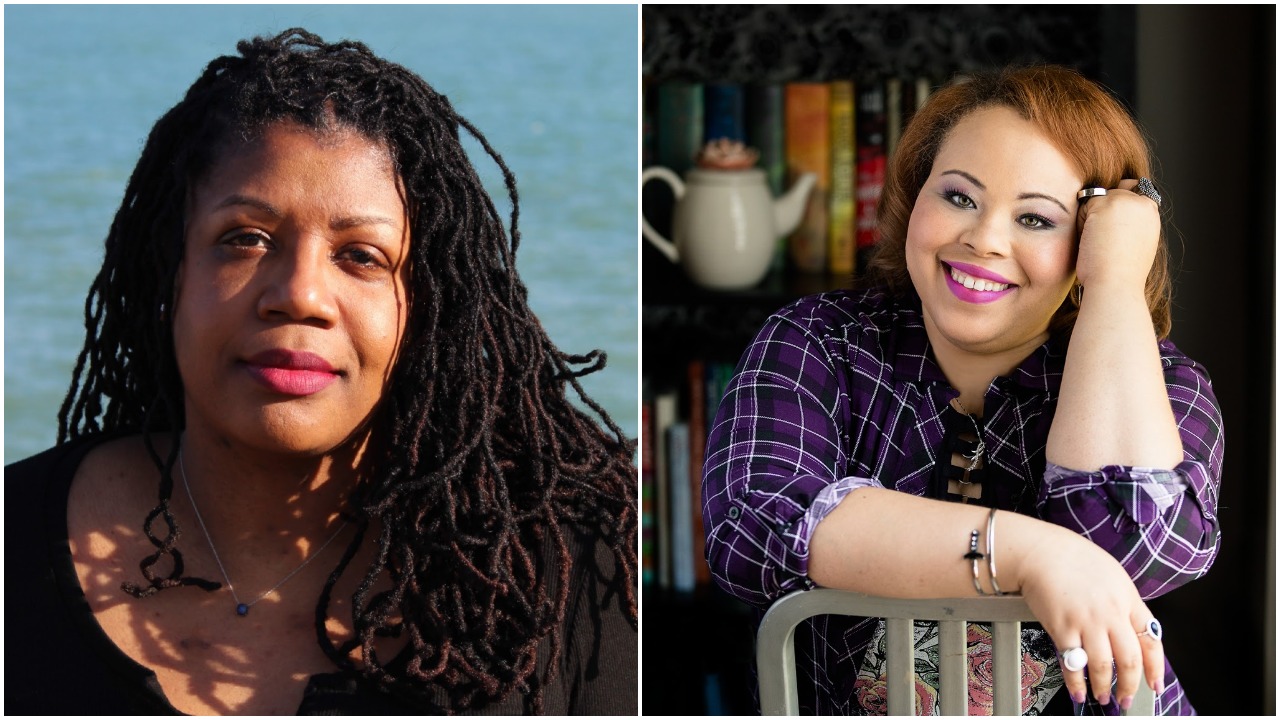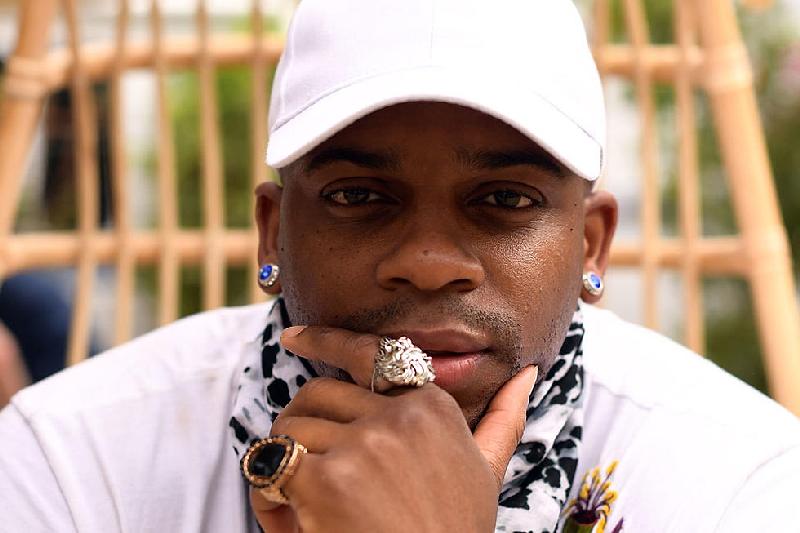
*Marvel’s Black Widow character was created by and has been predominantly written from the perspective of men … until now.
Fans of the Marvel universe are invited to tap into a new story with Natasha Romanoff, Marvel’s Black Widow: Bad Blood, on the premium reading and audio entertainment platform Serial Box.
The story was written by an all-female writing team, including Mikki Kendall and L.L. McKinney, two influential Black women in the comic space.
Reunited and it feels so good. The Black Widow and Winter Soldier are back in @Marvel’s #BlackWidow: Bad Blood. Listen to a new episode NOW. https://t.co/nO8SNmhL1R @LindsaySmithDC @spyscribe @Karnythia @ElleOnWords @Taylor_Stevens @sarahnatochenny pic.twitter.com/0lfDXHY2d0
— Serial Box (@serialboxpub) May 20, 2020
Can you talk about your involvement in Marvel’s Black Widow: Bad Blood and the creative process behind bringing this story to life for Serial Box?
MIKKI: So in my case Alex Decanti reached out to me and asked if I would be into doing it and I said something off the cuff, “I don’t want to be the black girl who writes the black character who doesn’t speak more than four sentences.” I didn’t want to do a token project. Alex kinda laughed at me and said “I think I can give you something you’ll actually like.” Then presented Black Widow. I’m a comics girl, I’ve been reading comics forever. I enjoy anyone that’s going to kick ass. Especially for female characters. For me, I wanted to peek behind the kicking of the ass because sometimes for female characters it’s just like, “She kicks! She flips! She spins!” We know nothing about her personality except as it relates to a male lead so I was really excited about the chance to explore from a different angle.
L.L.: Alex also reached out to me. It was an interesting year for me because I got a couple offers for doing comic-y things via Twitter and this was also via Twitter. I was like “yes, I’ll do it, you don’t even have to finish the sentence.” What is Black Widow doing and where is she doing it? Just point me in the general direction and we’ll get it done. I was excited, especially when she told me who all was attached. It was one of those things where I fan-girled briefly and then had to be a professional.
MIKKI: I mean Alex pinched your cheeks and threatened you a couple times.
L.L.: In my defense, I was the idiot who decided that putting out two other books at the same time this was happening was smart. I hadn’t slept going into 2019. What is sleep anyway?
The Black Widow character was created by and has been predominantly written from the perspective of men – so what does it mean to you to be representing “Black Girl Magic” with the Marvel family?
MIKKI: When you’re doing a project like this you’re already coming into a collaborative space where you’re going to come in and look at each other and go, “okay, how can we make this a fully fleshed woman? Not just the weird thing which is what men think of women who fight back.” We’re women who write about women who fight back and women who are strong and who are still complete people outside of what they do to defend themselves or the world. I wanted to see Natasha become a real person, if I was going to work on her.
L.L.: Outside of the stereotypical this is a strong woman, meaning this is a strong woman because she exhibits traits that we consider strong in men. I think one of the best things I enjoyed in being able to do this with it being an all woman team was at no point was my expertise in this field questioned. At no point was anything I didn’t know seen as a weakness. We filled in holes for each other in various aspects of either the character or the story style or whatever because for me this is a new genre. I didn’t do spy stuff. But I do a mean fight scene, so here I am. I do banter. We were able to lean on each other and it wasn’t this idea of who knows Black Widow best. Or who knows this the most? Or who can answer these arbitrary questions to prove it? There was no gatekeeping. I think that was one of the best things; I didn’t have to prove why I was here.
A lethal bite from @Marvel‘s #BlackWidow: Bad Blood, now playing on Serial Box. ? https://t.co/k73N45zz64 @sarahnatochenny @Karnythia @ElleOnWords @LindsaySmithDC @spyscribe @Taylor_Stevens pic.twitter.com/DJX36nUtf0
— Serial Box (@serialboxpub) May 18, 2020
How often do you find yourself embedding parts of your own personality/your own quirks, into the female characters you craft?
MIKKI: Basically, I think the only way you can write a character like Black Widow, or any woman character as a woman in this milieu, is by embedding if not yourself specifically, the women that you know. It’s really easy to have a hollow suit female character for a really long time. Comics tend to focus on male heroes. It’s changing, we’ve been making that change, a lot of us. The biggest names have largely been male. Part of that has lent itself to the idea that female characters are sidekicks and not stars in their own rights. When you’re writing women in comics, it’s not just “let me write the exact same hero type as the male lead and then make it a girl.” It is: “let me write a fully realized person, who is a woman cis or trans, and let’s make her a complex person who also has these abilities who also lives in this universe.”
L.L.: We talked about it a little bit in other conversations where we spent so much time on Natasha’s background. A lot of this isn’t in the story itself but it’s stuff that you had to know to inform decisions that she made. I think this speaks to what Mikki’s saying, she doesn’t just do it because it’s what’s expected of a woman in a superhero setup. She does it because we’ve set up reasons; we’ve set up her personality, her circumstances, her situation. She’s not just doing this because it’s what is expected of the space she is supposedly occupying. But no, she’s making a decision or not making a decision – there are some things that she probably doesn’t do where people will be like, “but this is what she did over here.” Well, that’s that Natasha and this Natasha has these reasons and this going on in her life right now and that’s why she does what she does. That was one of the best parts. We were given the freedom to mold her in this world and in this universe that Serial Box has created and the story flowed out of that creative sandbox.
MIKKI: One of the things about it was even in terms of building her cover in the beginning, we wanted to make sure her cover was the kind of cover someone would craft if they were really doing what she does but also genuinely trying to move through a world without sticking out. We didn’t want to do “take off the glasses, now you know it’s a superhero version” of a cover.
The Marvel universe comes with a huge fandom. Did you give any consideration to that during the crafting of this story, or take certain precautions not to take too much creative freedom that would piss off the fans?
MIKKI: I don’t worry about them.
LL.: Yes and no. The main thing is when you’re coming in somebody else’s backyard, you want to be a good guest. You have to keep in mind, while you have been given freedom to make yourself at home, let’s not get too comfortable, right? But at the same time, it’s the same approach I take with my other work, whatever happens here happens here. Everything else still exists. This happening cannot take away that happening over there. At no point was I concerned how fans would or wouldn’t react because that will bind you up if you worry entirely too much. But also coming into it as a fan, there are people who like things that I like, if I like it those people will tap into it. There was no point where it was like, “are we going to make somebody mad?” As long as we do right by the character and by whose house we’re being invited to, as long as they’re cool with it, that’s how we do it.
MIKKI: When you’re doing something like this in any process at some point you have to commit to the idea of the story that you want to tell and as long as that story is within the parameters set by Serial Box and Marvel you can’t worry about individual fan reactions in part because no one is going to like everything. There is no way to please every member of a vast fandom. At a certain point, you have to love the character, you have to respect them and the house that you’re in, you also have to respect yourself and your talents enough to know I’m going to tell a kick ass story with these characters. And if somebody gets upset or doesn’t like it – I make a mean pound cake, not everybody eats it. There are a million and one other stories they can read.
Is it important to you to go online and read the comments from fans and see what the conversation and reaction is about the series?
MIKKI: I don’t read reviews. But that is my personal thing. Once I have made the story and it has been released, that is the end of my input. How fans react to it is their business. It’s one thing if the criticism is that I’ve done something transphobic or racist or something like that. That is feedback I would hope I would get from a sensitivity reader before anything went out. But as a generalized go-to whatever site, even if somebody really likes it, I think too often we’ve seen writers get hung up on the idea that everyone has to like what they do. They’re not going to. And for me, personally, it feels invasive to step into fans’ spaces and to expect those spaces to be comfortable to me as a creator.
L.L., you created the hashtag #whatwomenofcolorwritershear, tell us the meaning behind it.
LL: This was 2017, it feels like forever ago. There was another author that started the tag #whatwomenwritershear because someone had told her “I’m so glad I didn’t know you were a woman, I wouldn’t have picked up your book.” Particularly, for science fiction and fantasy. While this was going on, I realized there was this aspect where race comes into play that there are things that we hear that nobody else hears.
For instance, in the submission process, we have our one black girl book for the year because we’re apparently only allowed one. That’s the reason the story is being rejected because they already have one story. Doesn’t matter if it’s science fiction or fantasy or historical; there’s a black chick running around and the quota has been met. I started talking about that and other women of color in the industry picked up on it and it became a thing. We had told some ridiculous stuff and every now and then it still pops up. It was more like, “this is a thing that’s happening and this is how many of us it’s happening to.” Pretty much all. And now you can’t deny that it’s a thing. There’s no conspiracy, we’re all hearing the exact same things or variations of the same things.
This time, it’s personal.
Black Widow and Winter Soldier are teaming up for Marvel’s #BlackWidow: Bad Blood. Read or listen to the first episode for FREE on @SerialBoxPub: https://t.co/5pt2g7PgVe
— Marvel Entertainment (@Marvel) May 6, 2020
What’s your hope for the future of Black writers in the comics space?
MIKKI: I will preface this by saying I am exceptionally pig-headed. I’m what my family calls “a rebellious spirit.” That’s real euphemistic. I feel like there is not a point in publishing, in any part of publishing, where anyone is going to be necessarily willing to give us things. We see a lot of people trying to make it about quality when they talk about diversity. At a certain point, you have to say to yourself, “it doesn’t matter whether or not they want me here, I’m going to be here.” And you have to believe in you. That’s not a feel-goody thing. As someone who’s worked in a few different genres under the larger umbrella of publishing, I don’t expect people to be happy that I’m in the room that are not my complexion or people I already know. I expect them to be professional. This is a business. You don’t have to like me but you have to respect me, though.
And it’s from that I say to other writers coming in, this is not necessarily going to be a warm, soothing environment all the time. You have to decide whether or not you’re willing to let someone else’s “No” be the end of what you’re going to do or if you’re going to keep pushing. We’re not in a society that wants to give us anything, ever. So we might as well go in and fight for what we want and keep pushing. And push together. But absolutely we’re a country where we went from slavery to free. We’re not that far past slavery. We’re not that far past legally not being able to read. And now we’re professional writers. The world can change a lot. My great grandmother was the first person in my family legally allowed to read. Her parents were enslaved. I think that we have to respect what our ancestors did enough to keep fighting like they fought.
L.L.: I feel the same way. You’re happy for what’s done but at the same time you have to acknowledge how little has been done comparatively. And how much could be done if people actually cared. It’s one of those things where people in publishing or in comics will be like, “hey such and such is writing and this character is happening,” and I’m like, “well if you can name all five books or all five comics or all five graphic novels by these people of color over here but the others are too numerous for you to consider, that’s still a problem.”
Let’s not let the celebration keep the work from happening. Somebody’s always going to be mad at the fact that you’re here, that you would even think about potentially enduring the room is enough to bother them. I don’t think that’s ever going away. But I’m happy with where things are. I’m happy that we have these characters. But we’re still at the point where we’re still having firsts. Until we get past the point where we’re still having firsts, in my mind we can’t even entertain part of that question. Then come talk to me about whether or not I’m happy with it.
New episodes of Marvel’s Black Widow: Bad Blood air Tuesday. Listen here.
We Publish News 24/7. Don’t Miss A Story. Click HERE to SUBSCRIBE to Our Newsletter Now!





